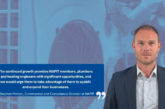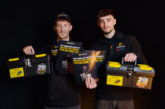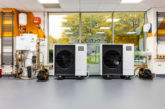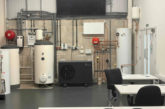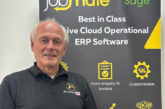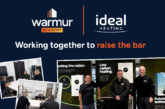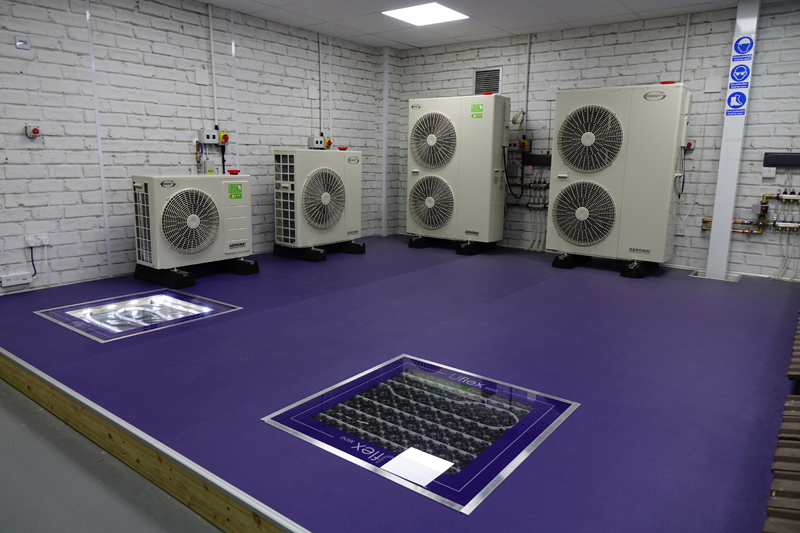
As consumer interest for renewable heating solutions grows, many installers are searching for ways to expand their knowledge of the sector. PHPI took a trip down to Wiltshire to report back from Grant’s Aerona3 heat pump course.
Thanks to Theresa May’s parting gift to the UK, interest for renewables sources of energy is once again growing amongst British consumers. The heating sector looks set to be at the forefront of the ‘net zero’ emissions aim by 2050, with the Committee on Climate Change report also influencing the previous Chancellor to pledge that natural gas will be banned from new builds from 2025. While the majority of engineers will continue to work on gas boilers for the time being, and scepticism from previous initiatives such as the Green Deal remains, change is likely not far around the corner and installers will need to be prepared when it comes.
For some, change is already well underway. Predominantly known for its oil fired boiler products, Grant is an established brand, particularly for those engineers who work in the off-grid sector. The company is already raising its game in the heat pump sector, however, with two of its Aerona3 R32 heat pumps recently being awarded the Quiet Mark – an accolade that recognises some of the quietist, but high performing products in the market. In addition, Grant has invested in its training facilities to offer a two day Aerona3 course, covering the commissioning, installation and specification process of its air source heat pumps, as well as the Grant VortexAir Hybrid, combining a heat pump and oil boiler.
Paul Wakefield, Grant UK’s Managing Director, explains why: “Interest is steadily growing for heat pumps, particularly with the recent announcements and pledges made by the Government. From this, we’ve seen a renewed interest in the market from installers, which is being driven by customer enquiries. Our training courses are designed for engineers with a range of experiences – some have never worked on heat pumps before, while others are simply looking for refresher best practice training.”
The course
This was certainly true on the course we attended. Speaking to the installers around the room, many had never worked on heat pump systems before, but highlighted the need to better their understanding so they could discuss options with customers. “Consumers are becoming a little wary of oil and non-renewable options, so I’ve definitely noticed more customers asking about heat pumps as alternatives,” commented one engineer.
Each two day course currently holds up to 10 participants, with the instructor detailing the workings of the Aerona3 unit. The first day covers mostly the installation, wiring and commissioning of the heat pump, alongside the use of the remote controller, while the second involves an explanation of system design, including heat loss calculations and pipe sizing, and a written assessment.
Sitting in on the afternoon of the first day – we just missed the complimentary lunch, unfortunately – the instructor covered off how to use the remote controllers to assess how the heat pump was working for servicing and maintenance, as well as how to set specific parameters for different scenarios. After the theory, installers were given the opportunity to work on the heat pumps in Grant’s practical training room.
For Phil Stanley, Training Manager at Grant UK, the focus on system design for the second day is vital to the learning process: “We ensure there is a focus on design because this is necessary to be considered when specifying heat pumps and the emitters they will work with. There is a much lower flow temperature running through the system, and therefore radiators must often be larger to deliver the output. Heat loss calculations, pipe sizing and emitter sizing are all vital steps to ensuring an efficient system is installed.”
Every little helps
The business doesn’t just offer training to support installers in the heat pump sector, either. MCS has long been a bugbear for smaller companies looking to get involved in the market – the paperwork side alone often requires a dedicated employee, confirmed by those we spoke to on the course. Grant’s G-CERT scheme aims to support engineers who wish to offer their end-users MCS compliant installations without having to undertake MCS accreditation themselves.
Through the scheme, Grant can certify renewable installations by acting as the MCS accredited organisation, assisting competent installers to complete renewable installations which will be eligible for RHI payments. The company will assist throughout the entire process, from heat loss calculations through to completing the necessary registrations. In doing so, Grant takes the paperwork out of installer’s hands, but allows them to offer customers peace of mind with MCS compliant installations.
The company now also offers package solutions with heat pumps, cylinders, fan convectors, radiators and underfloor heating – including its Uflex and Uflex MINI ranges – all tied up into one offering from merchants, once the appropriate calculations have been made.
Paul summarises: “Demand for heat pumps looks set to grow, and Grant is here to help support installers grow their businesses to ensure they can cater for this demand. We’d always recommend coming down to our training courses to get the most from our experienced training team and gain a better understanding of the market in general.”
www.grantuk.com/professional/training/courses/grant-aerona-air-source-heat-pumps-ashp/


